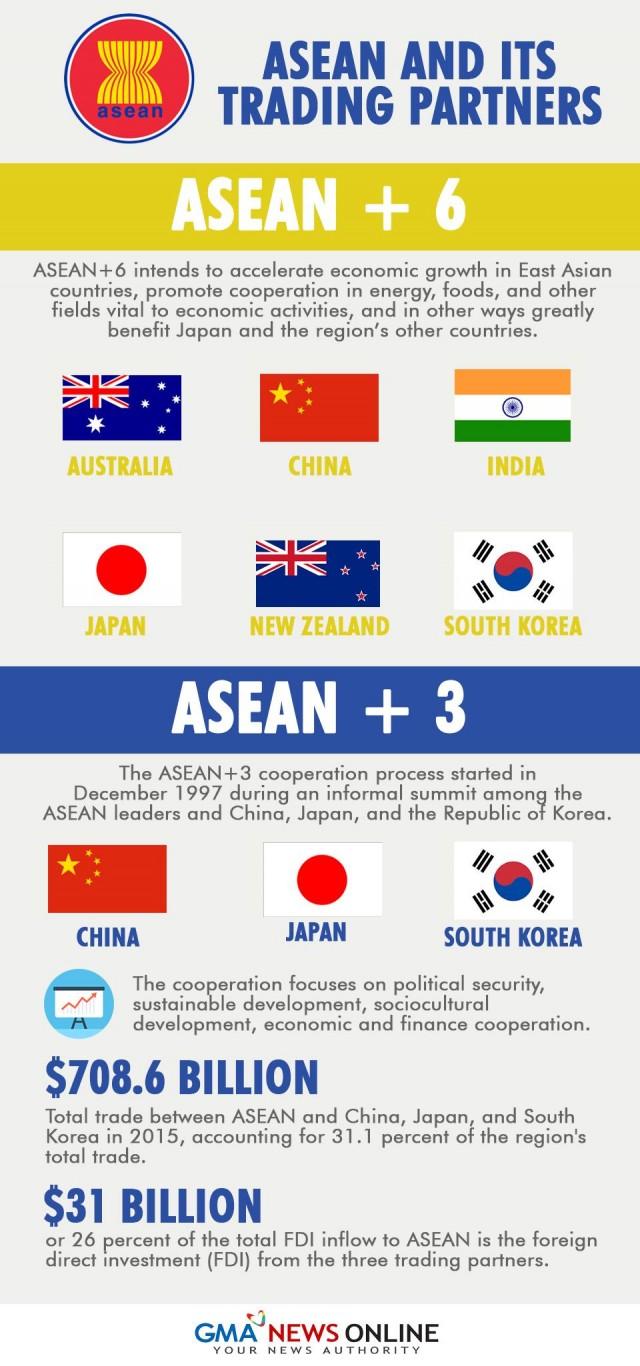ASEAN GOLDEN YEAR: Its relevance in trade shines 50 years after
Fifty years since its inception as a five-member association ensuring harmony in the region, the Association of Southeast Asian Nations (ASEAN) has come a long way as one of the largest economic trading blocs in the world.
The Philippines, however, believes that ASEAN still has a long way to go in discovering more of its usefulness and possibilities, now that it's become a 10-member regional bloc with a more global influence.
"It's still an untapped potential, [but] we're getting there. Pataas nang pataas 'yung ating trade with our ASEAN neighbors. Our trade with the ASEAN has been increasing very slowly but steadily over the years," Rosemarie Edillon, National Economic and Development Authority (NEDA) Undersecretary for Policy and Planning, said in an interview.
ASEAN data showed total trade in the region reached $2.270 trillion in 2015—$1.182 trillion worth of exports and $1.088 trillion of imports. The Philippines contributed $128.944 billion to total trade with $58.648 billion of exports and $70.295 billion of imports.
Edillon said the Philippines as this year's chairman of the summits and related meetings, which coincide with the bloc's 50th anniversary, wants to loosen trade restrictions to attract more foreign investors and promote regional growth.
"There is an ASEAN Economic Community (AEC) blueprint where countries have actually committed to open up more and more sectors. We are hoping that under our hosting, we want to see more of these sectors offered," she said.
Relevant strides

Socioeconomic Planning Secretary Ernesto Pernia said earlier the government plans to open up the sectors of professions, contractors, retail trade, and public utilities so other countries can invest more in the Philippines.
Edillon said ASEAN has made relevant strides in regional development, considering it was created to ensure regional cooperation amid disputes.
"If you remember the beginnings of the ASEAN, it actually began to ensure security in the area, especially for what we would say the founders of the ASEAN. We were conflicting, we were all claimants to the same territory and the ASEAN was there to ensure that there will be harmony in the region," she said.
Established on August 8, 1967, ASEAN was founded by "Founding Fathers" Indonesia, Malaysia, Philippines, Singapore, and Thailand to promote peace and stability in the region.
Brunei Darussalam joined on January 7, 1984, Vietnam on July 28, 1995, Lao PDR and Myanmar on July 23, 1997, and Cambodia on April 30, 1999, completing what is now a 10-member regional bloc.
The region's economy is currently the sixth-largest in the world, registering $2.6 trillion in gross domestic product (GDP) in 2016. It is now in talks with trading partners Australia, China, India, Japan, Republic of Korea, and New Zealand for the planned free trade agreement dubbed as the Regional Comprehensive Economic Partnership (RCEP).
The Philippines intends to continue pursuing solidarity among all the member-states of the regional bloc.
"We will pursue initiative and enhance cooperation with global partners to ensure that the ASEAN citizens live in peace, stability, security, and growth," President Rodrigo Duterte said when he accepted the chairmanship in September last year. — VDS/LA, GMA News




